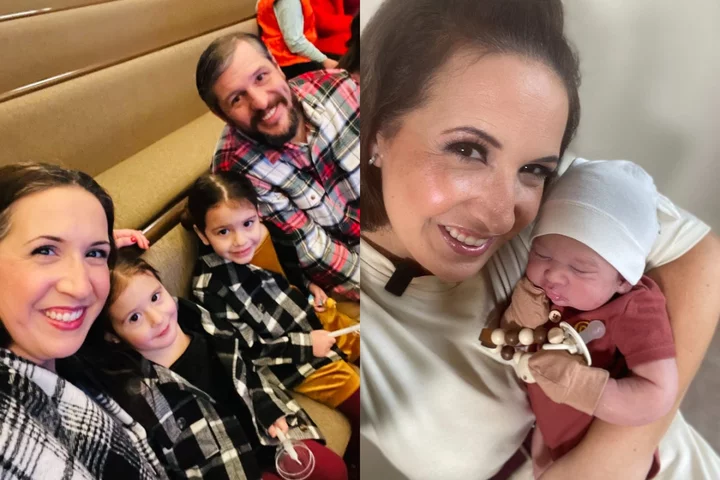
Mum’s husband fired from family business after she roleplayed with reborn dolls
A woman who turned to roleplaying with hyper-realistic dolls “to help (her) cope” with the death of her first baby – and continues to do so with her husband and two rainbow babies – has said her husband’s parents disapproved of the hobby and fired him from the family business as a result. Christina Keeler, 38, a stay-at-home mum and YouTuber, from Wyalusing, Pennsylvania, USA, fell pregnant with her first “miracle” baby in 2015, despite having endometriosis and being told she would not be able to conceive in her 20s. She suffered a miscarriage, but after watching a documentary about so-called reborn dolls, she had a “lightbulb moment” and realised getting a hyper-realistic doll would be the “perfect solution”. Christina’s husband Bill, 43, was “hesitant” at first but became supportive after he saw how much it “helped (her) grief”. The couple went on to have two “miracle” daughters, Grace, six, and Joy, four, who now help feed, change and dress the family’s five reborn dolls – which cost between £1,560 and £3,899 each – in their “nursery” complete with “a crib and a wardrobe”. The family often take the dolls out in public, and have shared their journey on YouTube – where Christina documents people’s reactions to her dolls and birthing videos. Some silicone dolls come in a fake womb which allows a Caesarean section to be performed at home. But Bill’s family were “disgusted” with the hobby, to the point where they gave him a choice to stop having the dolls or leave the family business. He refused to shut down the YouTube channel and did not want Christina to give up her hobby, so he was fired. She fell pregnant with her first baby in 2015, a year after her mother died of cancer. The couple were “elated” about the pregnancy because Christina had been told in her twenties that she would not be able to conceive because she has endometriosis, but she miscarried at eight weeks. Christina told PA Real Life: “When we lost the baby it was so devastating, I remember lying in the hospital bed after they had taken the baby out of my belly, and screaming for my mum and wept wanting to cuddle my baby.” She “really struggled” with the grief of losing her mother and her baby so close together. She explained: “This feeling of sorrow just never went away, it was so painful that I never talked about it again.” Despite having her two “miracle” children Grace and Joy, Christina still longed to hold her first baby, and after watching a documentary about reborn dolls, she wanted to get one to see if it would help her grief. She said: “I felt so blessed to have two healthy girls, but that feeling of missing the first baby never quite went away. “When my youngest was around two years old, my husband and I came across a documentary about reborn dolls. “And he was like, ‘That’s really weird’, and I played it off that I thought the same, but actually I really wanted one to help me cope and I thought it would be the perfect solution.” After persuading her husband, Christina ordered her first lifelike doll, Hannah, costing her around £155. She said: “I told my husband and he was not on board at all, he was hesitant, but after explaining my reasoning, he was much more understanding and more accepting.” When the doll arrived, Christina instantly felt like it helped with her mourning. She said: “It helped me therapeutically because for the first time ever when I got my first reborn doll, I was able to talk about the loss of our baby. “And since then I have healed tremendously from that loss because I’m able to talk about it and share my story and help others – it helped my grief, for sure.” Christina now has a collection of five dolls called Carter, Cadence, Quinn, Isabella and Sammy, which she loves to dress, cuddle and feed. She takes the dolls out in public and people often mistake them for real babies. She said: “We have a nursery for them with a crib and a wardrobe. I check on them throughout the day, and on other days, especially when the girls want to get involved, I pick out an outfit for them, bring them to breakfast, get them to feed them a bottle, change them. “If we’re running errands we often take them out with us and put them in a car seat and stroller.” Christina and her family have been sharing their experiences on YouTube, where they are known as The Reborn Family. She said: “I make videos about people’s reactions to my dolls, as well as vlogs and birthing videos – I have some silicone reborn dolls which come in a womb and you perform a C-section on it at home, to give birth to the baby.” Despite her immediate family being supportive of the hobby, Christina admits not everyone in her wider family understands. She said: “My husband’s family were, and still are, disapproving of the reborns, even though they can see how much they helped me. They were disgusted. “We moved from California to Pennsylvania because my husband was next in line to take over the family business because they were about to retire, and they asked if we would like to do so and we agreed. “When they were on vacation they came across our YouTube channel, and they called us up and they were mortified and so embarrassed, and said we were ruining the family name.” When Bill’s parents came home, they gave him an ultimatum to stop having the dolls. Christina explained: “Bill said that he was not going to quit his job, and didn’t want me to stop having reborns because they were so therapeutic for me at the time, and his dad said, ‘Well, then you’re fired’.” My husband’s family were disgusted, they said we were ruining the family name Bill’s father was contacted by PA Real Life for comment, but he had not responded at the time of publication. Even though her reborns have caused tension in the family, Christina cannot see herself giving up her hobby any time soon. She said: “Reborns continue to help me with my grief, and I love sharing content with other people who have lost babies, and they can also really help people with dementia, people who are infertile, people with anxiety and depression, I wouldn’t want to stop this.” Read More Teenager who thought she was pregnant diagnosed with ovarian cancer Woman praised for response to parents who asked her to swap first class seat with their child Barbie vs Oppenheimer: Greta Gerwig makes history with biggest box office opening for a female director Charity boss speaks out over ‘traumatic’ encounter with royal aide Ukraine war’s heaviest fight rages in east - follow live
2023-07-24 19:24
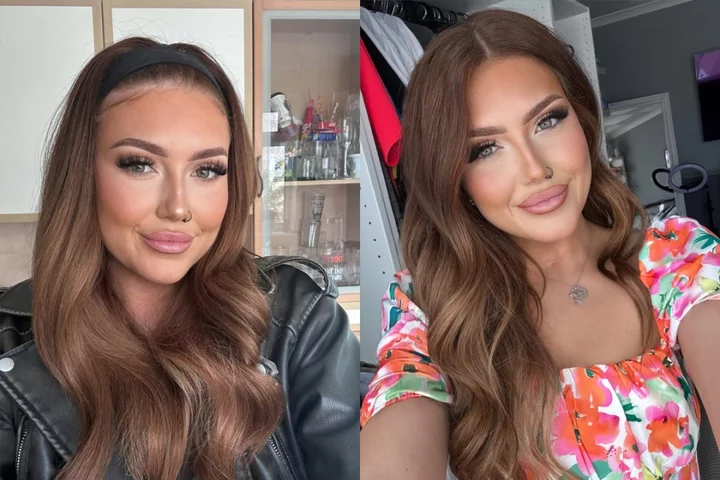
Teenager who thought she was pregnant diagnosed with ovarian cancer
A teenager who thought she was pregnant after her stomach unexpectedly became rounder, and who was told it was constipation by her GP, was later diagnosed with ovarian cancer and is now a student nurse after realising “life is too short”. Summer Edwards, 22, a student nurse at the University of the West of England, from Bristol, went from a size six to size 10 “in a matter of weeks” and thought she was pregnant in 2020, but her GP reassured her that it was constipation. After trying strong doses of laxatives and having two catheters fitted, nothing improved, and she was eventually diagnosed with an ovarian cyst which doctors were able to remove successfully. However doctors then found an extremely rare 19cm by 17cm tumour and Summer was diagnosed with stage one ovarian cancer. Summer had keyhole surgery to remove it, which was a success, but she also found out she had a rare gene, DICER1, which meant she was more susceptible to other types of cancer. Six members of her family have since been diagnosed with the gene, including her 16-year-old cousin who now has lung cancer, but Summer says she is a “fighter”. Since Summer was diagnosed with cancer she has been training as a student nurse, which is something she has “always” wanted to do. In May 2020, at the age of 18, while working in a hospital as a healthcare assistant, Summer began to notice her stomach was getting rounder, but put it down to eating a few extra treats at work. She said: “My mum was convinced I was pregnant, and I began to believe it, but I took a pregnancy test and it came back negative. “I went from a size six to size 10 in a matter of weeks, and one day I was in the garden in a bikini and my mum said that she thought something was really wrong because my stomach was really round.” To reassure her mum, Summer went to her GP and was prescribed a strong dose of laxatives, as they thought she was constipated. But after two weeks of taking the medication nothing changed, so Summer was called in to her GP surgery. Summer said: “The doctor felt my stomach and they said something was not right, but I didn’t think much of it.” Summer also had blood tests, and spotted that her blood was being run for a CA-125 test, a tumour marker for ovarian cancer, and a few days later was asked to have an internal ultrasound, where she was told her bladder was “completely full” with more than a litre of urine. Doctors told Summer there was “nothing they could do at that point” so, after asking her doctor friend for advice, she went straight to A&E and had a catheter fitted. She said: “I was devastated, I was only 18 and I really didn’t want to be walking around with a catheter strapped to my leg or be signed off work for 12 weeks.” After a few days of being catheterised, Summer continued urinating as usual, so she returned to the hospital and had another fitted. But the following day she began experiencing a great deal of pain. She said: “It was weird, I went to the toilet and I noticed a lot of blood in the bag, and I was still weeing. “I was taken into hospital – at this point, I was screaming in pain.” Summer then had a CT scan, and it was found that her bladder was never full – instead, she had a large ovarian cyst which was successfully removed with surgery. But two weeks later Summer went for her post-operation check-up and was told she had a 19cm by 17cm tumour. She said: “They told me I had a Sertoli-Leydig cell tumour, which was really rare. “They told me there was only one other person in the UK that had it at that point and my blood tests came back fine on the CA-125 marker because it causes a boost in testosterone so didn’t show as a marker. “It didn’t sink in at all, and the first thing I did was take my sick note to work – I was gutted I couldn’t work. “When I told people there, they cried, so I did too, but it didn’t hit me for a while.” On July 1 2020 Summer had a hospital appointment to find out more about her tumour, and to her devastation she found out she had ovarian cancer. She said: “They explained more about my tumour, and that there have not been any clinical trials for it because it’s so rare. “I put it bluntly and asked them if I had cancer and they said yes. “My mum was upset about it more than me – I think it’s more scary for those around you.” About two weeks later Summer had keyhole surgery to remove the tumour, which was a success. She said: “I was so relieved, and in my post-op review they asked me if I wanted preventive chemotherapy and I said no, as the pros outweigh the cons for me. “I’d rather live my life now and deal with chemotherapy in the future if it ever comes back.” Since then Summer has had internal ultrasounds every three months, which will continue for the next ten years. She has also been genetically tested, and she was diagnosed with DICER1 syndrome – an inherited disorder that increases the risk of cancerous tumours, most commonly in the lungs, kidneys, ovaries and thyroid. Summer said: “I now know that if I have kids, they will probably have the gene, and I’ve looked into IVF and PGD (preimplantation genetic diagnosis) but there is no licence to test for DICER1, I’d have to go and ask for one to be made. “I know that I’m probably more likely to get another type of cancer in the future too.” Summer’s immediate family tested negative for the gene, but when Summer’s aunt came to one of her appointments with her, she believed her daughter, Summer’s 16-year-old cousin, had the gene. Summer said: “After tests, my aunt and five of her children have the gene, and one of them has lung cancer but she’s a fighter.” Now Summer is a student nurse – she has “always wanted” to work in healthcare, and has been doing so since she was 17, but when she received her cancer diagnosis it pushed her to apply for university. She said: “My tutors are amazing and I have had time off for scans and things, but I absolutely love it. “Having the diagnosis made me realise there’s no time to wait and life is too short.” For more information, visit: targetovariancancer.org.uk/ or www.nhs.uk/conditions/ovarian-cancer/. Read More Teenager who thought she was pregnant diagnosed with ovarian cancer Jonnie Irwin details experience with palliative hospice care Carol Vorderman shares warning to sunbathers after skin cancer scare Jonnie Irwin details experience with palliative hospice care Carol Vorderman shares warning to sunbathers after skin cancer scare This is how often you should actually change your razor
2023-07-24 18:56
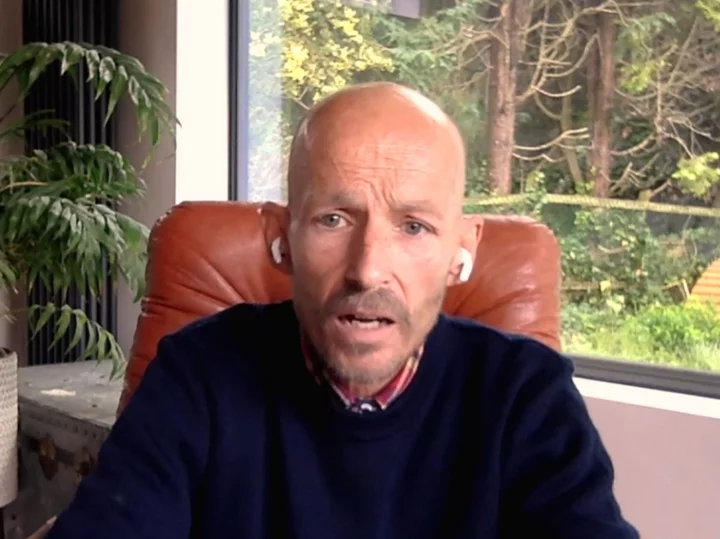
‘It’s not the doom and gloom you might think’: Jonnie Irwin details experience with palliative hospice care
Jonnie Irwin has spoken out about his “really good” experience with palliative care in a hospice, amid his journey with terminal cancer. The A Place In The Sun presenter, 49, appeared on BBC Morning Live on Monday (24 July) and gave viewers an update on his current health and treatment. Reassuring hosts Gethin Jones and Helen Skelton that his family is doing “great and very noisy”, Irwin was asked about his experience with palliative care, which focuses on improving the quality of life for anyone facing a life-threatening condition. Irwin said that he has been in palliative care since the day he received his terminal cancer diagnosis. He was first diagnosed with lung cancer in August 2020, but only publicly shared the news in November 2022 after it spread to his brain. He described his hospice experience as a “delight”, adding that his initial perception of such facilities were that they were “very much a boiling hot room full of people who looked frail and towards the end of their days”. However, it was “nothing of the sort” when he did actually go in. “It’s spacious, energised, comfortable,” Irwin told the show, adding: “I’ve had a really, really good experience at my hospice.” He urged anyone who is facing a terminal diagnosis to “embrace” end-of-life care and to try going to a hospice if they have been offered the choice. “My first experience of palliative care and hospice was blood transfusions,” he explained. “I had my first blood transfusion in hospital and then was invited to use the hospice, so I have it a go as a day patient and went into a lovely room. “I implore people to check out hospices. If you’ve got the choice of using it, then use it… I encourage people to explore that option because it’s not the doom and gloom operation you might think it was.” In June, Irwin made a rare red carpet appearance at the Television and Radio Industries Club (TRIC) Awards and said he is taking “every day as a gift as it comes”. When he first revealed his terminal cancer diagnosis, the Escape To The Country host said he “doesn’t know how long” he has left to live, but hopes he will inspire people to “make the most of every day”. He also celebrated his “best ever” Father’s Day last month with his three sons, Rex, four, and twins Rafa and Cormac, three, with wife Jessica Holmes. Irwin recently revealed that sometimes he has to “remove himself” from his family home to go to a hospice when he is in a lot of pain because it makes him “not good to be around”. He told Hello! magazine: “I’m like a bear with a sore head and I don’t want [my family] to be around that.” In another appearance with podcast OneChat previously, he said that being in pain affects his mood, explaining: “I have been close to death’s door, twice at least. You lose your memory, you lose your patience. I have got a very short temper. It’s not made me a better person, that’s for sure.” Read More Ruth Handler: The Barbie inventor who revolutionalised prosthetic breasts and narrowly avoided prison Fans defend Prince Harry and Meghan Markle amid breakup rumours Tim Shaddock rescue: Ben Fogle offers to pay for Australian sailor and dog to be reunited after emotional separation Carol Vorderman shares warning to sunbathers after skin cancer scare This is how often you should actually change your razor Are we working out too hard?
2023-07-24 17:22
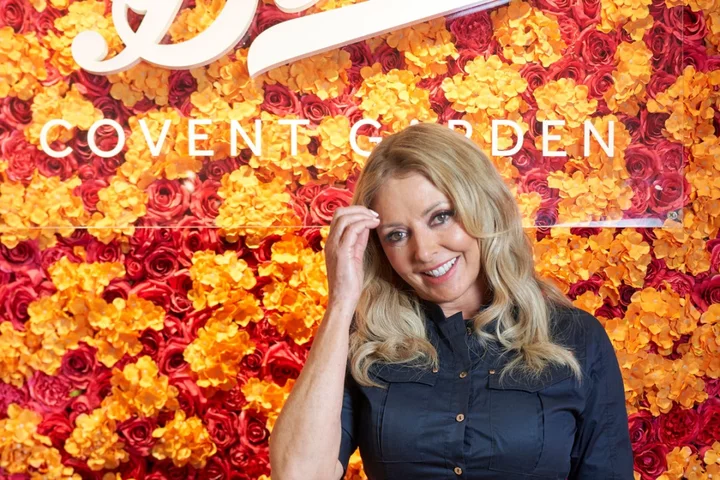
Carol Vorderman shares warning to sunbathers after skin cancer scare
Carol Vorderman was well and truly a sun worshipper growing up. “Oh God, yes. I was burning away merrily for many, many years,” she remembers with a groan. The former Countdown presenter, 62, says her generation was the first to really become obsessed with the sun. “I’m of the generation where we started to sunbathe – my mother’s generation didn’t. We were also caught in the formative years, the 60s, 70s, 80s, where we had absolutely no idea of what sun protection was – you just couldn’t buy it. I think it was the 90s that began,” she explains. “So in all of our youth we were encouraging each other to sunbathe doused in cooking oil.” Vorderman remembers the ways people would try and boost their tan – from sunbathing surrounded by metal foil (so you could “get all the rays of the sun” and “burn nicely”) to discovering sunbeds (“we thought they were marvellous”) – and she was particularly keen on soaking up as much of the sun as possible, as she grew up by the sea. She says anyone her age “will remember all that”, but now “we know the dangers”. Vorderman is unsurprised by Cancer Research UK’s latest statistics, showing melanoma skin cancer cases in the UK have reached an all-time high. According to the charity, 17,500 cases are diagnosed every year, with projections suggesting the numbers could increase by 50% over the next 20 years. Research suggests people around Vorderman’s age are increasingly affected, with the probability of people aged 55 and older getting skin cancer almost tripling since the 1990s. Bristol-based Vorderman herself had a scare when she was around 50. She was concerned by some changes in her skin, so went to see a dermatologist – who sent off a biopsy for testing, with results revealing the cells were precancerous. The presenter is at pains to emphasise she doesn’t want people to feel sorry for her – “I had no symptoms, nothing like that” and the cells were removed – but she’s instead trying to highlight how crucial it is to be sun safe. “What I do now is I’ve had a check-up every year, all over, ever since,” she says – and that isn’t the only change she’s made. “I slather myself in SPF at all opportunities. In many ways, the damage is already done, but I don’t sunbathe now, or I cover myself up.” Vorderman has teamed up with Boots brand Soltan and Macmillan Cancer Support on a sun-safety campaign, and her efforts to raise awareness around the issue aren’t just inspired by her own experiences. Her mother died in 2017 after suffering from three types of cancer – the third being melanoma. “Not a single time in her life did she sunbathe – my mum had a different skin to me, she had moles, I don’t,” Vorderman says. “I know that makes you much more prone to melanomas.” Cancer Research UK cites a study that found melanoma risk was higher in people with more than 100 moles compared with people who have fewer than 15 moles. For Vorderman, talking about these issues, whether publicly or among friends, is key. “It’s part of life. The more we talk about it, the better it is – as with everything. It’s like talking about the menopause, talking about women’s issues, talking about all sorts of cancers… As we know with all cancers, the sooner you can have something checked, the better the outcome should be.” Vorderman has in recent years made a name for herself for posting her unfiltered political beliefs on social media, and whether it’s talking about politics or causes close to her heart, she won’t back down. “I’ve always been pretty confident, but now you get to a point in life where you think – I feel strongly about things as they stand in this country at the moment. I’ve never known anything as bad. I think everyone should speak out.” She believes in the old saying: ‘The only thing necessary for evil to triumph is for good people to say nothing’, adding: “I take that with me.” Read More Charity boss speaks out over ‘traumatic’ encounter with royal aide Ukraine war’s heaviest fight rages in east - follow live Carol Vorderman: Why my skin cancer scare means I no longer sunbathe This is how often you should actually change your razor Are we working out too hard?
2023-07-24 17:18
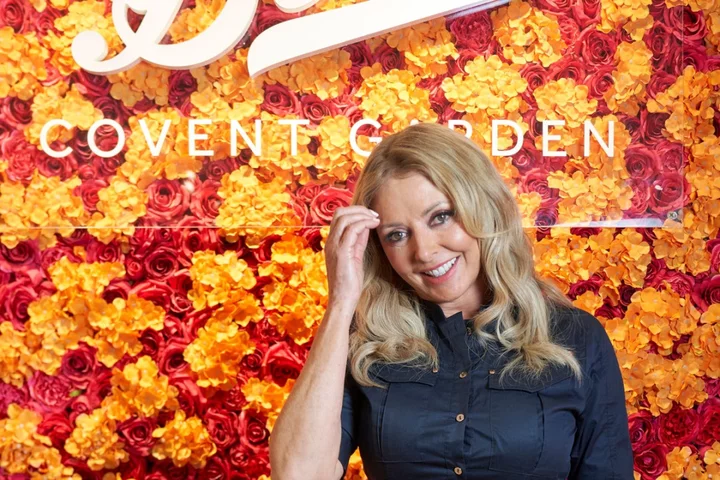
Carol Vorderman: Why my skin cancer scare means I no longer sunbathe
Carol Vorderman was well and truly a sun worshipper growing up. “Oh God, yes. I was burning away merrily for many, many years,” she remembers with a groan. The former Countdown presenter, 62, says her generation was the first to really become obsessed with the sun. “I’m of the generation where we started to sunbathe – my mother’s generation didn’t. We were also caught in the formative years, the 60s, 70s, 80s, where we had absolutely no idea of what sun protection was – you just couldn’t buy it. I think it was the 90s that began,” she explains. “So in all of our youth we were encouraging each other to sunbathe doused in cooking oil.” Vorderman remembers the ways people would try and boost their tan – from sunbathing surrounded by metal foil (so you could “get all the rays of the sun” and “burn nicely”) to discovering sunbeds (“we thought they were marvellous”) – and she was particularly keen on soaking up as much of the sun as possible, as she grew up by the sea. She says anyone her age “will remember all that”, but now “we know the dangers”. Vorderman is unsurprised by Cancer Research UK’s latest statistics, showing melanoma skin cancer cases in the UK have reached an all-time high. According to the charity, 17,500 cases are diagnosed every year, with projections suggesting the numbers could increase by 50% over the next 20 years. Research suggests people around Vorderman’s age are increasingly affected, with the probability of people aged 55 and older getting skin cancer almost tripling since the 1990s. Bristol-based Vorderman herself had a scare when she was around 50. She was concerned by some changes in her skin, so went to see a dermatologist – who sent off a biopsy for testing, with results revealing the cells were precancerous. The presenter is at pains to emphasise she doesn’t want people to feel sorry for her – “I had no symptoms, nothing like that” and the cells were removed – but she’s instead trying to highlight how crucial it is to be sun safe. “What I do now is I’ve had a check-up every year, all over, ever since,” she says – and that isn’t the only change she’s made. “I slather myself in SPF at all opportunities. In many ways, the damage is already done, but I don’t sunbathe now, or I cover myself up.” Vorderman has teamed up with Boots brand Soltan and Macmillan Cancer Support on a sun-safety campaign, and her efforts to raise awareness around the issue aren’t just inspired by her own experiences. Her mother died in 2017 after suffering from three types of cancer – the third being melanoma. “Not a single time in her life did she sunbathe – my mum had a different skin to me, she had moles, I don’t,” Vorderman says. “I know that makes you much more prone to melanomas.” Cancer Research UK cites a study that found melanoma risk was higher in people with more than 100 moles compared with people who have fewer than 15 moles. For Vorderman, talking about these issues, whether publicly or among friends, is key. “It’s part of life. The more we talk about it, the better it is – as with everything. It’s like talking about the menopause, talking about women’s issues, talking about all sorts of cancers… As we know with all cancers, the sooner you can have something checked, the better the outcome should be.” Vorderman has in recent years made a name for herself for posting her unfiltered political beliefs on social media, and whether it’s talking about politics or causes close to her heart, she won’t back down. “I’ve always been pretty confident, but now you get to a point in life where you think – I feel strongly about things as they stand in this country at the moment. I’ve never known anything as bad. I think everyone should speak out.” She believes in the old saying: ‘The only thing necessary for evil to triumph is for good people to say nothing’, adding: “I take that with me.” Broadcaster and author Carol Vorderman MBE is working with Boots brand Soltan, which is joining forces with Macmillan Cancer Support for the second year running, as its official sun-safety partner.
2023-07-24 16:46
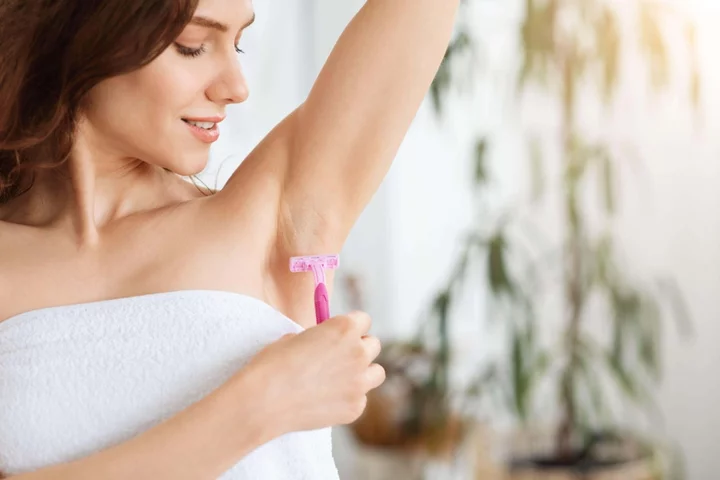
This is how often you should actually change your razor
Reckon you could get another shave out of your razor? We’ve all done it, wondering how long we can actually use one, as we whip it out again and again. Well, it may not be worth the risk to your health, according to dermatologist and Dove expert, Dr Cristina Soma. So, how often should you change your razor? “More people cling on to their razors for much longer than is advised, and are surprised when we recommend that a razor is changed every five to seven shaves,” says Soma. “The frequency of change also depends on other factors, such as how frequently and how many areas you shave, your hair thickness and type, the quality of your blade, and whether you are good at washing it off afterwards and looking after your blade.” What happens if you don’t? “Most of us own a dull blade full of skin cells, soap and hair debris. In the worst cases, you can also see rust on the blade,” Soma says. “When all this grime accumulates and the blade dulls, you are less likely to get a close, smooth shave, and more likely to cut yourself. Bacteria can accumulate on the blade and have some serious consequences, too. “Using a dull razor blade can result in shaving rash and bumps, ingrown hairs, and inflamed or traumatised skin. More seriously, it can result in cuts and possibly lead to infections,” she explains. Infections “You could get any kind of infection from using an old, unsharp razor. After a while of using the same blade, bacteria starts to grow, which will create irritation on your underarms,” she explains. Shaving armpits, pubic hair and legs may cause real issues. “The most common form of infection would be a bacterial skin infection, with symptoms including redness, swelling, pain or pus. Treatment for this would be an antibiotic ointment. “To really care for your underarms, you need to change your razor frequently, use a shaving cream or gel, shave in the direction of hair growth and rinse the blade thoroughly, then store it in a clean, dry place. “Furthermore, the underarm area is very delicate, so take care in choosing a deodorant that supports the skin barrier,” explains Soma. Resistance and irritation If you feel any resistance when shaving with an old razor, it could cause an issue. “If you can feel your razor tugging at your hair, rather than gliding over it smoothly, it’s likely blunt and will cause skin irritation, razor burn and ingrown hairs,” says Dr Tim Clayton, consultant dermatologist at Pall Mall Medical in Manchester. “Ingrown hairs can lead to bacterial infections, hyperpigmentation and keloids [a type of raised scar] so it’s important to avoid these where possible,” he says. Rust If you see a hint of orange on there, it isn’t worth using. “Tetanus can be spread via a wound caused by a rusty object, but it isn’t the rust that will cause tetanus – it’s the bacteria on the razor. “If you’re concerned about contracting tetanus, make sure you’re up to date with your tetanus vaccinations,” says Clayton. Concerns about cost In a 2021 International Journal of Women’s Dermatology study, women’s four-blade razors were priced 66% higher than men’s, who may be less inclined to shave their bodies. So, if changing your razor is costly, it may be worth considering your relationship with your body hair. “There is no hygiene benefit to shaving your body hair. What you choose to do is completely up to you,” says Soma. “Increasingly, we are seeing more acceptance and diversity in what people do with their hair, and from a medical standpoint, as long as you’re doing it in a hygienic and safe way, carry on.” Read More Charity boss speaks out over ‘traumatic’ encounter with royal aide Ukraine war’s heaviest fight rages in east - follow live Are we working out too hard? How to perk up urban balcony gardens and window boxes Sadiq Khan and Romesh Ranganathan: Women still aren’t equal in politics and comedy
2023-07-24 16:21
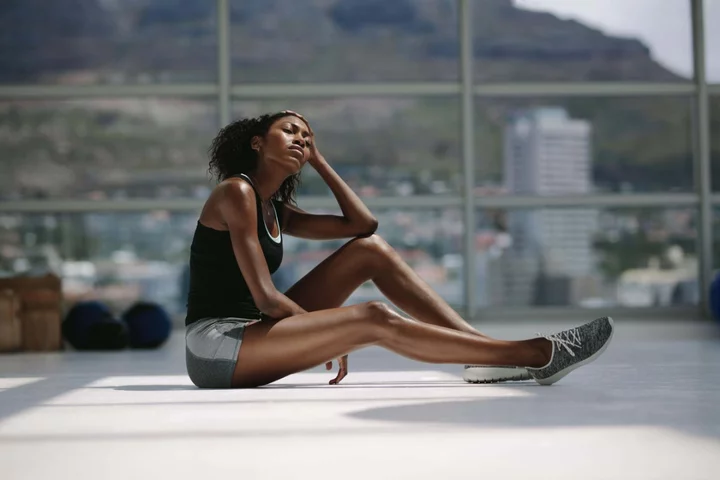
Are we working out too hard?
There’s a reason high-intensity interval training (HIIT) is so popular – it’s designed to give you a killer workout in a short amount of time. HIIT classes are short, sharp bursts of exercises where you’re working out above 85% of your maximum heart rate, and Sean Johnson, regional fitness manager at Orangetheory Fitness, can see why they’re “tempting”. “A lot of people are pressed for time and seek a ‘quick fix’. To many people, the assumption is ‘no pain, no gain’ and so therefore seek out a hard-hitting, pulse-shattering workout to undo the unhealthy habits they may have gotten themselves into,” he says. “A hard workout can feel very rewarding when you move fast and blast around for a short time.” Plus, there are benefits to HIIT training, with Johnson saying: “A shorter, more intense workout does have the ability to elicit a longer afterburn compared to a less intense longer workout.” But is there a chance we’re overdoing it, in a bid to ‘get the most’ out of our workouts? There’s a growing trend for lower intensity exercise – often using a heart rate monitor so you can track where you’re at – which might provide a whole host of benefits, without making you feel a bit sick. Signs you might be overdoing it “Working at a maximal heart rate can sometimes cause people to feel lightheaded, dizzy, faint and nauseous. This isn’t very fun and can also deter people from coming back,” suggests Francesca Sills, exercise physiologist at Pure Sports Medicine. Johnson agrees: “Working out for too long at an intensity that is too high can put numerous stresses on the body such as fainting, vomiting and even serious cardiovascular and respiratory health issues.” A heart rate monitor can help you track how hard you’re pushing yourself, but if you don’t have one, Johnson recommends going by “feeling”. Orangetheory uses three terms to define your perceived exertion: “Base pace is a ‘challenging, but doable’ feeling, push pace is an ‘uncomfortable feeling’ and all out is an ‘empty the tank feeling’,” Johnson explains. He doesn’t recommend spending more than a minute in the ‘all out’ section, and other signs you might be overdoing it include “fatiguing earlier than you normally do, dizziness, light headed, you get injured or have joint and muscle pain regularly”. Downsides to HIIT? Sills suggests there aren’t necessarily downsides to HIIT, just “things to be wary of”. She says: “If you’re working very hard for a long time or for longer than you are used to, it’s possible that you’ll finish the session feeling unwell rather than energised.” Johnson says there is the risk of overtraining with regular HIIT classes. “In the shorter term, working out at an intensity too high can stress your adrenal glands and stimulate the release of cortisol (the stress hormone). In turn, this can have numerous side effects such as increased blood pressure, increased heart rate, encourage fatigue and ultimately hinder recovery. “If your body cannot recover properly, you will find it hard to get into a regular routine with your fitness and will see a lack of results.” The benefits of slowing down Johnson suggests incorporating lower-intensity exercise into your routine can improve your everyday life. “Doing workouts that don’t raise your heart rate to the extremes can help reduce the risk of injury (and risk of falls and trips), reduce fatigue and pain, elevate your mood, improve sleep quality, while still helping to burn calories,” he says. Sills mentions how ‘zone two’ workouts are a “hot topic” in the fitness world recently – this is a type of low-intensity, sustained exercise where you’re working at around 65-75% of your maximum – for example, going for a gentle jog where you can still hold a conversation. She says these types of workouts are gaining popularity because of the “large amount of benefit it brings to the health and efficiency of your cardiovascular and metabolic systems”. If you’re used to leaving it all on the floor with an intense workout every time you hit the gym, it can be tricky to know how to slow down. Johnson recommends using the ‘FITT principle’ to adjust your exercise routine: Frequency: Instead of doing your four workouts next week try doing only threeIntensity: Do your normal four workouts, but take it down a notch in each one.Time: Instead of doing four x 90 minute workouts next week, maybe try doing four x one hour workouts.Type: Switch it up and use different equipment or style of workout. Johnson adds: “Having slower days will enable you to focus more on the form and technique, which transfers over to the high intensity days as well.” Doing HIIT safely While it’s a good idea to mix up your workouts with different intensities, there are a few things you can do to make sure you don’t overdo it in HIIT. Sills recommends ensuring “you are eating well to fuel your body for performance”, and “get on top of your sleep routine to allow your body to rest and repair”. If you’re a newbie to exercise, she wouldn’t necessarily recommend a HIIT class immediately: “If you haven’t done much training before, it’s important to learn how to do things right and build a good base level of strength and fitness before going in and smashing yourself. If you aren’t sure how to perform exercises well when you’re fresh, you aren’t setting yourself up for success when you’re fatigued.” And finally, she says: “It’s important to work within your own limits. Often these classes are busy, loud and intense and people can be encouraged to continue to do more weight, more reps, etc. Issues arise when people push too far beyond what they can manage. Instead of working at a 10/10 all the time, drop it back to an eight to nine.” Read More Charity boss speaks out over ‘traumatic’ encounter with royal aide Ukraine war’s heaviest fight rages in east - follow live How to perk up urban balcony gardens and window boxes Sadiq Khan and Romesh Ranganathan: Women still aren’t equal in politics and comedy SPF cocktailing: Why you should steer clear of the buzzy TikTok trend
2023-07-24 15:47

Gemma Atkinson and Gorka Marquez share newborn son’s sweet name and first photo
Gemma Atkinson has announced the name of her second child with Gorka Marquez as she shared the first picture of the infant. The couple, who met when the former Emmerdale star took part in BBC reality show Strictly Come Dancing in 2017, welcomed their first child earlier this week. In her original post, Atkinson, 38, shared that she had given birth to a boy, with the pair spending a joyous week together before Spanish dancer Marquez, 32, heads off to rehearsal for the new series of Strictly. On Saturday (22 July), Atkinson shared her first photo of her baby son sleeping in his cot in a blue t-shirt. She confirmed his name in the comment section, writing: “Thiago Thomas Marquez [heart emoji]. Our family is complete.” Atkinson and Marquez’s fellow Strictly stars flooded the comment section with support, with pro Oti Mabuse calling the picture “beautiful”. It Takes Two host Janette Manrara commented: “Look at him! CONGRATULATIONS GUYS!” Dianne Buswell said that Thiago was a “mini” version of his father, while Karen Hauer wrote: “Oh the most beautiful little one. Felicidades.” The couple, who already share a three-year-old daughter, Mia, were not partnered up on Strictly in 2017, but started dating after the series finished. Atkinson gave birth to Mia in 2019, during which she he needed an emergency c-section and suffered a haemorrhage after the birth, losing nearly a litre of blood. Following the experience she said she was initially “adamant” that she and Marquez would not want another child. Appearing on Steph’s Packed Lunch last year, she recalled: “All these things were going through my mind, what did I do that caused all that to happen? I was telling myself for weeks and weeks I’d failed at childbirth. “I was having horrible dreams that someone was going to take Mia from me. I remember my mum running into my bedroom and I was sat up screaming, sweating.” Marquez will appear as a professional dancer on the forthcoming series of Strictly Come Dancing, which kicks off in September. One fan favourite pro who won’t be taking part this year, however, is Amy Dowden, following her breast cancer diagnosis. The Welsh dancer, 32, told fans she’d been diagnosed with breast cancer in May and underwent a full mastectomy to treat the disease shortly after. Dowden had shared ambitions to compete on the dancing competition this year, saying that only chemotherapy would affect whether she’d compete on this year’s Strictly. However, on Friday (21 July), Dowden shared that she would be needing to have chemo after more tumours were discovered following her mastectomy. “They found another type of cancer and then they told me I needed chemo – for me that was a massive blow,” she said. “It wasn’t in the plan, originally – and I know the plan you can’t get fixated on. “This year, it means I’m not going to be able to dance with a celebrity on Strictly, but I’m in such regular contact with the team – the BBC have just been utterly incredible,” she said. Read More Fans defend Prince Harry and Meghan Markle amid breakup rumours Tim Shaddock rescue: Ben Fogle offers to pay for Australian sailor and dog to be reunited after emotional separation Father sparks outrage for calling son ‘spoiled’ after 23-year-old said he can’t throw wedding for under $7,000 Gemma Atkinson announces birth of second baby in heartwarming Instagram post Myleene Klass says she’s ‘changed history’ as government pledge miscarriage support Researchers warn after 25 types of toxic flame retardant found in human breast milk
2023-07-23 22:26

‘We’ve changed history!’ Myleene Klass celebrates as government pledge more miscarriage support
Myleene Klass has celebrated “changing history” after the government announced plans to better support women who miscarry while pregnant. For the last four years, the former Hear’Say singer has been backing changes to the Women’s Health Strategy in Parliament. This included a call to ensure women will not have to suffer up to three miscarriages before receiving help – an issue sensitive to Klass due to her personal experience with miscarriage. On Saturday (22 July), the Department of Health and Social Care announced a package of new measures to "boost the health and wellbeing of women and girls", including a pilot scheme that will see medical intervention for women after every miscarriage. As the pledge was made, Klass, 45, shared a picture to Instagram of herself and Labour MP Olivia Blake stood outside the Houses of Parliament celebrating the win. In the photo, Klass is wearing a yellow power suit while Black wears a floral dress, with the two campaigners holding signs that read “we did it” and “miscarriage matters”. “WE DID IT!!!!” the I’m a Celebrity… Get Me Out Of Here! star captioned her lengthy post. “We have changed the law and therein, history! The world is officially a better place for women and their families because we never gave up. “I met @oliviablake_mp filming my Bafta nominated Miscarriage documentary. We were both battered and bruised from our MC experiences but from that moment we joined forces and I became a campaigner for change to Miscarriage law and women’s health care.” She continued: “Women’s health has always been a contentious, almost invisible issue. Miscarriage is the final taboo, dismissed as ‘one of those things’ or ‘it wasn’t meant to be’. I now know that not to be the case. Change has to come from the top, from Government. Who knew our wombs are owned by Westminster?!” Klass then explained what the new law meant and how baby loss charity Tommy’s would be helping going forward. This includes more support for those experiencing miscarriage, retraining medical staff to handle the issue and updated guidelines for the Royal College of Obstetricians and Gynaecologists. “That’s the official line,” she continued, “The personal side of this is 4 miscarriages along, pouring the heartache and frustration into fierce campaigning HAS WORKED. We have changed the future for so many mothers to be and babies to come. “This will all take time, but it’s officially confirmed and will be actioned… I wanted my children to see their mother turn her pain into power and the babies I never got to hold, to know they chose a mother who would fight to have their voices somehow heard. I never dreamed those voices would resonate into the history books and their legacy would be the most powerful of all, real change.” The changes come after a published pregnancy loss review, which looked at improving NHS gynaecology and maternity care. Minister for women’s health Maria Caulfield said: “Our work continues to support women through the agony of pregnancy loss… We will keep working and investing so girls and women across the country can benefit from the world-class healthcare they deserve.” Earlier this month, Klass had spoken out defiantly in support of the proposed changes to the law, saying that the government did not “deserve power” if it failed to implement them. “A health secretary and a health department and a government that doesn’t look after the people, that is in a position and empowered to do so, doesn’t deserve to hold [onto] that power,” she said. Read More Tim Shaddock rescue: Ben Fogle offers to pay for Australian sailor and dog to be reunited after emotional separation Fans defend Prince Harry and Meghan Markle amid breakup rumours Father sparks outrage for calling son ‘spoiled’ after 23-year-old said he can’t throw wedding for under $7,000 Myleene Klass: Government does not deserve power if miscarriage policy unchanged Researchers warn after 25 types of toxic flame retardant found in human breast milk Amy Dowden announces absence from Strictly Come Dancing due to chemotherapy
2023-07-23 16:57

Amy Dowden says she won’t compete in Strictly Come Dancing this year due to chemotherapy
Amy Dowden has shared her gratitude for the kind words she’s received from fans after revealing more about her cancer diagnosis. The Strictly Come Dancing professional dancer, 32, told fans she’d been diagnosed with breast cancer in May. She underwent a full mastectomy to treat the disease shortly after. Dowden had been waiting to discover what further treatment she’d need, having noted that chemotherapy would affect whether she’d compete on this year’s Strictly. In an Instagram Live chat with breast cancer survivor and Paralympic gold medallist Erin Kennedy for the charity CoppaFeel! on Friday (21 July), Dowden spoke out about being told she’d need chemotherapy after more tumours were discovered following her mastectomy. “For me my journey everything changed,” she explained. “I was originally going to have a lumpectomy, radiotherapy and hormone treatment. But then, after my MRI, they found another tumour so then it changed into a mastectomy and then, after my mastectomy, unfortunately, they found even more tumours. “They found another type of cancer and then they told me I needed chemo – for me that was a massive blow,” she continued. “It wasn’t in the plan, originally – and I know the plan you can’t get fixated on.” Dowden admitted that she had reservations about beginning chemotherapy as she feared it would interfere with her dance practice. “For me, straightaway, it was my dancing – like, you can take away my boob but you can’t take my dancing away from me and that’s what I get really upset about,” she recalled. Though Dowden had hoped to return to Strictly this year, the effects of the chemotherapy mean that she will not return in a competitive capacity for the forthcoming season. She added: “This year, it means I’m not going to be able to dance with a celebrity on Strictly, but I’m in such regular contact with the team – the BBC have just been utterly incredible.” After the live broadcast ended, the performer shared an additional message on her Instagram stories thanking everyone for the “love and support” that has been directed her way. She wrote: “I’ll tackle this next step the best I can and very blessed to have the love and support of my family and friends along with you guys. “The rest of the year looked very different to what was planned but hopefully I’ll enter 2024 cancer free and I’ll never take anything for granted and promise to live life to the full.” Dowden joined Strictly in 2017, and has competed in every series since, reaching the final in 2019 with kids’ TV presenter Karim Zeroual. Read More Tim Shaddock rescue: Ben Fogle offers to pay for Australian sailor and dog to be reunited after emotional separation Father sparks outrage for calling son ‘spoiled’ after 23-year-old said he can’t throw wedding for under $7,000 Fans defend Prince Harry and Meghan Markle amid breakup rumours Researchers warn after 25 types of toxic flame retardant found in human breast milk Mother calls out ‘double standard’ after husband is praised for doing ‘bare minimum’ Couple praised after sharing intimate bathroom TikTok: ‘The reality of birth’
2023-07-22 20:19
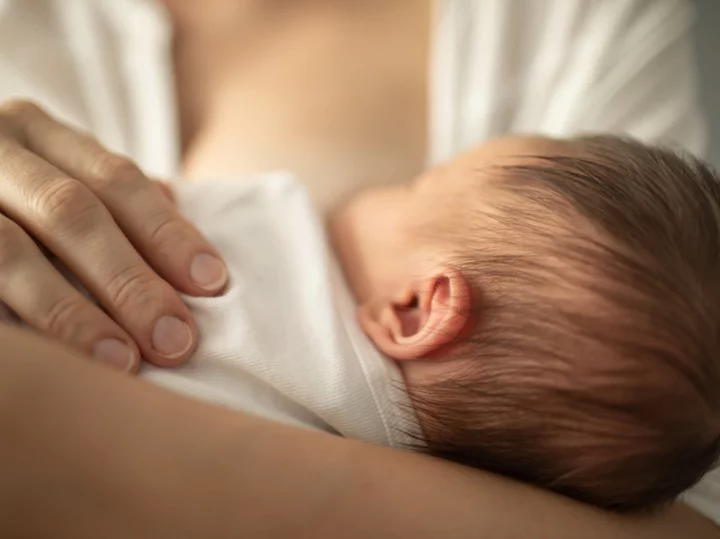
Researchers warn after 25 types of toxic flame retardant found in human breast milk: ‘Disturbing’
Toxic flame retardants have been found in human breast milk, research has revealed. A new peer-reviewed study published in the Environmental Pollution journal has identified 25 types of toxic flame retardants in human breast milk in the US, posing a “disturbing” threat to breastfeeding infants. After analysing breast milk samples of 50 mothers from the Seattle area, researchers at Toxic Free Future, Emory University, the University of Washington, and Seattle Children’s Research Institute found brominated flame retardants (BFRs) – a class of man-made compounds commonly used in products like upholstered furniture, televisions, and insulation. Researchers have warned that these chemicals, as well as the presence of flame retardants in human breast milk, can have an “adverse effect on human health” and “early-life exposures are of greatest concern”. One type of flame retardant found in the breast milk samples were polybrominated diphenyl ethers (PBDEs), despite these compounds being phased out by manufacturers nearly 10 years ago. Efforts to ban PBDEs came around in 2003 after the toxic chemicals were found in the breast milk of 20 mothers in the US. Chemical producers quickly stopped the sale of PBDEs for use in upholstered furniture, and they were eventually banned by the US Environmental Protection Agency. Companies then turned to another, largely unregulated BFR called bromophenols, which are used in electronics and have been shown to affect hormone levels in infants. While the research found that levels of banned PBDEs had declined in breast milk samples – 70 per cent lower than they were 20 years ago – bromophenols were present in 88 per cent of the breast milk samples tested, ultimately replacing one banned chemical with another, unsafe chemical in the same class. “Our results show that when we prohibit the use of persistent toxic chemicals like PBDEs, we make breast milk safer for babies,” said Erika Schreder, study co-author and science director at Toxic Free Future, a group that has advocated for new regulation of industry and consumer products. “But it’s disturbing to find that the replacement chemicals are now building up in breast milk.” Brominated flame retardants are often put into casings for TVs and other electronics. Studies have shown that these chemicals can escape out of products into indoor dust and air, outdoor air, surface water and of course, breast milk. BFRs have also been linked to negative health impacts such as learning problems, hormone disruption, and reduced fertility. “It’s concerning to find flame retardants in breast milk that can disrupt hormones and affect children’s brain development,” said Dr Amina Salamova, study co-author and assistant professor at Emory University’s Rollins School of Public Health, adding that bromophenols have already been found to “affect key thyroid hormones during fetal development”. Local, state, and federal policy makers have since taken steps towards regulating harmful flame retardants. In December 2021, New York governor Kathy Hochul signed into law a bill that restricted the use of flame retardants in furniture, mattresses, and electronic displays. The law also prohibited the use of organohalogen flame retardants (OFRs) in electronic enclosures, such as televisions. The European Food and Safety Authority has also banned or restricted the use of certain BFRs and BFR-treated products throughout the EU to protect health and the environment. “I hope we can learn our lesson this time and put policies in place that address the entire class and make sure chemicals used in products are known to be safe,” said Schreder. Read More Baby formula crisis: As the cost of living bites, meet the parents struggling to feed their infants Keke Palmer claims she faced ‘breast milk discrimination’ at airport: ‘Why is that not a crime?’ Couple doing IVF lets their dog decide baby’s sex Women in certain professions ‘may be at higher risk of ovarian cancer’ – study Mother calls out ‘double standard’ after husband is praised for doing ‘bare minimum’ Couple praised after sharing intimate bathroom TikTok: ‘The reality of birth’
2023-07-22 05:45
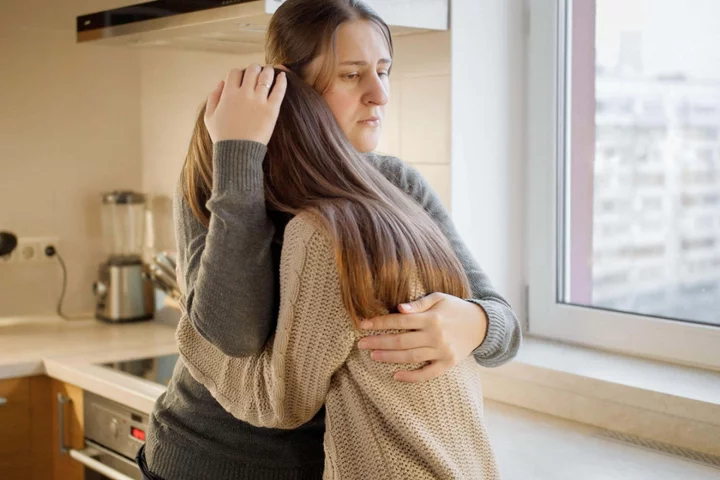
The qualities to teach your kids that are more important than exam results
With results day around the corner, your child might be feeling stressed about what comes next if academia isn’t their thing, or they don’t think they performed well in their GCSEs or A Levels. As a parent, you may find it difficult to know what to say beyond clichés if their exam results aren’t ‘glowing’, especially when you know your teenager has strengths outside of the exam hall. So, how can you respond supportively? And what qualities can you reassure them are more important than exam results? Be there for them firstYour child is likely to be upset – read the room and consider their emotions before diving in with advice or questions, or expressing your own feelings about the situation. “While it is only natural to feel your own sense of disappointment, as best as possible, we need to put aside our emotional response and be a calm, safe place for our kids,” says psychologist and author of Self-Care For Tough Times, Suzy Reading. “It can help to identify a time later to express your own feelings – you’re not stuffing them down or denying them, you’ll make space to bear witness to them later,” Reading adds. “Take a couple of long exhalations and listen without rushing in to fix. Support and allow your child to express all the feelings and thoughts that will come cascading. Action planning can come later – they just need to feel heard, understood, validated and cared for.” Exams aren’t everything It is helpful to remind them that this isn’t the be-all and end-all. There’s lots more to a person than their grades and exam results. “While exams can be really important, it’s also good to remember that they are not the only measure of success,” says Gemma Campbell, counsellor and clinical content specialist at Kooth Digital Health. “There are plenty of amazing qualities you have that standard exams don’t measure – resilience, determination, humour, curiosity, courage, compassion and kindness,” Campbell adds. Well-rounded skillsets And going forward into the professional world, there are really valuable skills and traits that are not exam-based. “While academic achievements have a significant place, they should not overshadow the development of essential skills and qualities that make great business leaders and entrepreneurs,” says Sarah Austin, director of the British Business Excellence Awards. Creativity For example, creativity is paramount to innovation. “In a rapidly evolving business landscape, creativity has become a prized asset,” says Austin. “Motivating our children to think outside the box – questioning established norms – and exploring alternative solutions is what nurtures their creative potential. “Grades may measure the ability to absorb and regurgitate information, but creativity is what propels individuals to envision new possibilities and drive innovation,” she adds. “The ability to approach problems from different angles, to adapt to change and to create something entirely new will position our children as the trailblazers of tomorrow in the business world.” Passion If there is something your teen loves, encourage it. This can help harness lots of other useful skills in the process – such as curiosity, determination and focus. “One of the most valuable skills a person can possess is passion. Encouraging our children to explore their interests and pursue their passions will ignite a flame within them – when they do something they genuinely love, they are more likely to invest their time and effort wholeheartedly,” Austin says. “By instilling the belief that passion is a driving force, we can empower our children to shape their future careers based on what truly inspires them. In the business world, this passion translates into unwavering dedication and a genuine love for what a person does – setting the stage for remarkable achievements.” Resilience Disappointing exam results may be a setback, but how they respond to them may show their greatest skill: resilience. “In the face of challenges and setbacks, the ability to bounce back and persevere is essential – cultivating hardiness and resilience in our children will hand them the tools to overcome obstacles and navigate the unpredictable nature of the business world,” Austin says. “While grades may provide a temporary measure of success, it is the tenacity and determination to push forwards that truly separates outstanding leaders from the rest.”
2023-07-21 14:56
